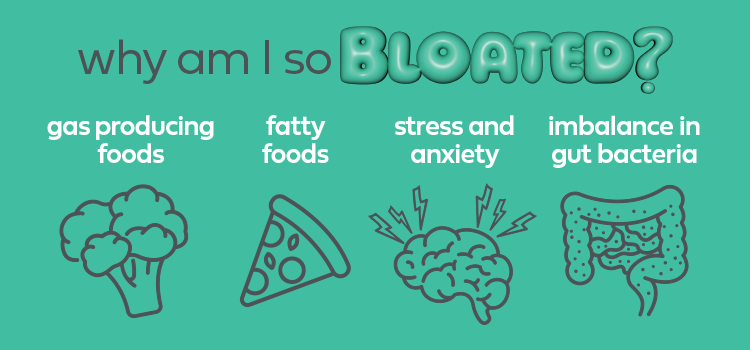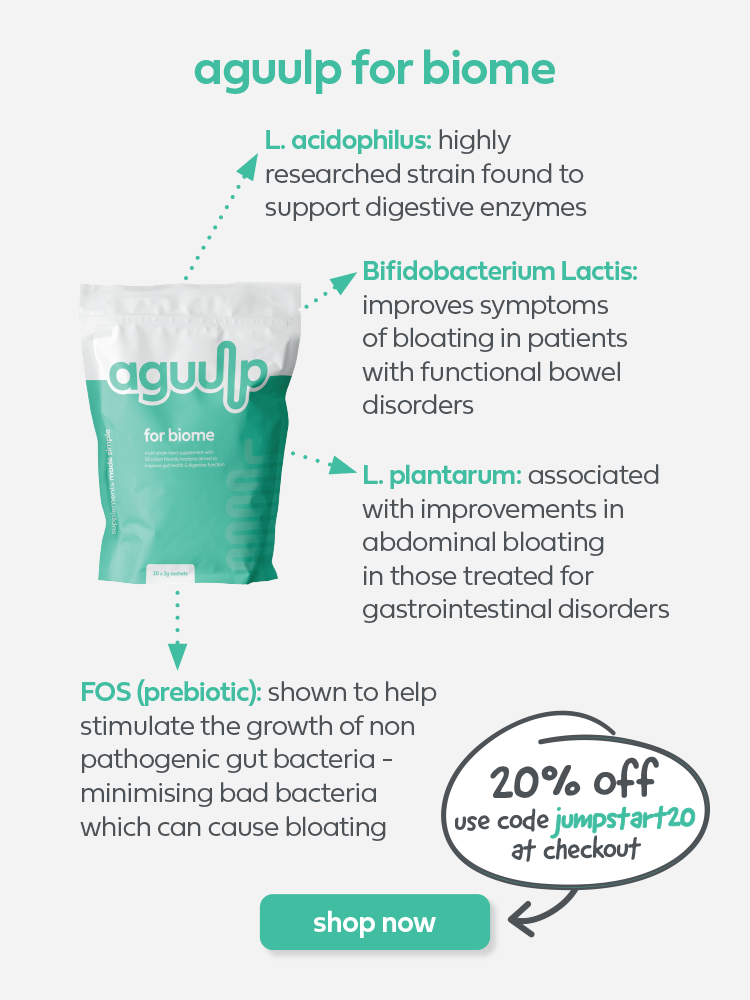What causes bloating?

From cancelling dinner plans due to the discomfort of wearing tight jeans to sleepless nights from stomach cramps, we understand that bloating is far from ideal.
In this week’s Expert Series, we delve deeper into bloating and explore the potential causes from certain dietary choices to the impact of stress to our body. We also get our experts to offer their tips to help you navigate through this common digestive woe.
Why am I so bloated?

Bloating is a common digestive symptom characterised by a feeling of fullness, tightness, or swelling in the abdomen. There are several causes for bloating so it’s important to remember that every individual is different and can be triggered by certain factors whilst others not. This is an extensive list of what could be possibly causing that dreaded bloat.
Dietary choices: One of the main causes of bloating is due to the food we eat and even our eating habits. Common dietary causes include:
Gas-producing foods: Some foods, such as:
- Beans
- Lentils
- Broccoli
- Cabbage
- Onions
- Carbonated beverages contain carbohydrates that are difficult to digest, leading to the production of gas in the intestines.
Fibre-rich foods: While fibre is essential for digestive health, a sudden increase in fibre intake or consuming large amounts of high-fibre foods can cause bloating until your digestive system adjusts.
Artificial sweeteners: Sugar alcohols like sorbitol, mannitol, and xylitol, often found in sugar-free gum and certain diet foods, can lead to bloating and gastrointestinal discomfort in some people.
Fatty foods: High-fat foods can slow down digestion and lead to a feeling of fullness and bloating.
Food intolerances: Some people may have intolerances to specific substances in food, such as lactose (found in dairy products) or gluten (found in wheat and related grains), which can lead to digestive symptoms including bloating.
For more information on the specific bloat-inducing foods, check out our blog on bloating and how probiotics can help.
Imbalance of gut bacteria: a condition known as dysbiosis. The bacteria that naturally reside in our gut produce gas as a by-product of the food that is digested and fermented there. Too many bad bacteria in the gut (dysbiosis) can lead to excessive levels of gas and bloating.
Constipation: When stool accumulates in the colon, it can cause bloating and discomfort. Constipation can be caused by a low-fibre diet, dehydration, or certain medications.
Overeating: Consuming large meals or eating too quickly can overwhelm the digestive system, causing bloating. With this being said, a common cause of bloating from overeating is due to swallowing of air. Ingesting air while eating, drinking, or chewing gum can introduce excess gas into the digestive system, leading to bloating.
Gastrointestinal Disorders: Chronic bloating may be associated with underlying gastrointestinal conditions, such as irritable bowel syndrome (IBS), inflammatory bowel disease (IBD), or small intestinal bacterial overgrowth (SIBO).
Hormonal changes: Some individuals, particularly women, may experience bloating as a symptom of hormonal fluctuations, such as during the menstrual cycle – ovulation in particular.
Stress and anxiety: Stress can affect gut function and lead to digestive symptoms, including bloating. The gut-brain connection plays a significant role in this relationship. We will discuss this more in detail below.
Medications: Some medications, including certain antibiotics and pain relievers, can cause gastrointestinal symptoms, including bloating, as a side effect.
If you experience persistent or severe bloating, or if it is accompanied by other concerning symptoms such as weight loss, blood in stool, or changes in bowel habits, it’s advisable to consult a healthcare provider to determine the underlying cause and receive appropriate treatment.
Can stress cause bloating?

Stress and bloating are interconnected in a very interesting way, and understanding this relationship involves delving into the intricate connection between the brain and the gut, often referred to as the gut-brain axis. For more information on the gut-brain axis, read our blog on the Gut-Brain Axis: What you need to know. https://www.aguulp.com/the-gut-brain-axis-how-to-support-it/
It’s important to recognise that the relationship between stress and bloating is bidirectional, which means it goes both ways. Just as stress can lead to bloating, experiencing chronic or severe bloating can also be a source of stress and anxiety. This creates a cycle where stress and bloating reinforce each other, which may be a reason why bloating can be a common occurrence for many of us.
Here are a few examples of how stress can lead to bloating:
Activation of the fight-or-flight response: When we experience stress, whether it’s due to work pressure, personal concerns, or other factors, your body responds by activating the “fight-or-flight” response. This is an evolutionary function that prepares the body to respond to perceived threats. During this response, the body directs resources away from non-essential functions like digestion (which may cause bloating) in order to focus on immediate survival needs.
Altered gut motility: The nervous system, which controls involuntary bodily functions like digestion, is divided into two branches: the sympathetic nervous system (SNS) and the parasympathetic nervous system (PNS). The SNS is activated during stress and can slow down gut motility. This can lead to food staying in the stomach and intestines longer than usual, which can contribute to feelings of fullness and bloating.
Changes in gut permeability: Chronic stress may lead to increased gut permeability (the ability for gases/liquids to go through), often referred to as “leaky gut.” This occurs when the lining of the gastrointestinal tract becomes more porous, allowing substances that should remain in the gut to pass into the bloodstream. These substances can trigger an immune response and inflammation, which can contribute to gastrointestinal symptoms, including bloating.
Altered microbiota: as mentioned above, stress can also affect the composition and balance of the gut microbiota, the community of bacteria and microorganisms that inhabit the digestive system.
Food choices under stress: we’re all guilty of it, stress eating. When we experience stress, we may occasionally turn to comfort foods that are often high in fat, sugar, and salt. These choices can disrupt digestion and lead to bloating. Moreover, stress can impact food choices and eating behaviours, potentially causing overeating or irregular meal patterns, both of which can also contribute to bloating.
Tension and muscle contractions: Stress can lead to increased muscle tension, including in the abdominal region. This tension can interfere with the normal rhythmic contractions of the gastrointestinal tract, slowing down the movement of food and gas and causing bloating.
Exacerbation of existing digestive conditions: Those who suffer with pre-existing digestive conditions, such as IBS or IBD, may find that stress exacerbates their symptoms. Bloating is a common symptom of these conditions, and stress can intensify their impact on the gut.
Stress-induced hormonal changes: stress can lead to hormonal changes, including increased cortisol production (stress hormone). Cortisol can influence various bodily functions, including gut motility and sensitivity, which can contribute to bloating.
Our expert tips to help relieve bloating:

As great as it would be to have a magic pill to stop bloating, what’s key here is to remember that managing bloating involves a combination of lifestyle changes, dietary modifications, and stress reduction techniques. Here are some of our expert tips for managing bloating:
Diet-related tips:
Keep a food diary: you might be rolling your eyes to this one but diet is a common cause for bloating so being able to identify the specific trigger foods of your bloating could really help. Record what you eat and drink, along with any symptoms you experience. Over time, patterns may emerge that reveal which foods or drinks are more likely to cause bloating.
Gradually increase fibre: While fibre is important for digestive health, introducing too much fibre too quickly can lead to bloating. Gradually increase your fibre intake by adding small amounts of high-fibre foods like fruits, vegetables, and whole grains to your diet to allow your digestive system to adapt.
Stay hydrated: Drinking plenty of water throughout the day can help prevent constipation, which can contribute to bloating. Proper hydration keeps stool soft and facilitates regular bowel movements.
Limit gas-producing foods: Reduce your consumption of gas-producing foods like the ones mentioned above. If you choose to eat these foods, consider cooking them thoroughly or eating smaller amounts.
Limit artificial sweeteners: If sugar alcohols like sorbitol, mannitol, or xylitol trigger your bloating, be cautious with foods and products containing these sweeteners. Check labels for sugar alcohol content.
Probiotics: Consider incorporating probiotics into your diet or as supplements to support a healthy gut microbiome. Probiotics may help alleviate bloating, especially in cases related to gut dysbiosis. We explain more below on the effects of probiotics and bloating.
Lifestyle-related tips:
Chew food thoroughly: It may sound silly but properly chewing your food can reduce the amount of air you swallow, which can lead to bloating. Eating slowly and taking time to chew can help prevent excess air ingestion.
Mindful eating: Pay attention to your meals and avoid distractions like watching TV or working while eating. Mindful eating can help you eat more slowly, savour your food, and reduce the likelihood of overeating, which can contribute to bloating.
Regular physical activity: Engaging in regular exercise can help stimulate bowel movements and promote healthy digestion. Aim for at least 30 minutes of moderate physical activity most days of the week.
Stress reduction techniques: can be an effective way to reduce bloating and other gastrointestinal symptoms. Practise stress-reduction techniques like:
- Meditation
- Deep breathing exercises
- Progressive muscle relaxation
- Yoga
- Journalling/reading
Remember that individual responses to dietary and lifestyle changes can vary, so it may take some experimentation to identify the most effective strategies for managing your bloating. Always consult with a healthcare provider for personalised advice, especially if your bloating is severe, chronic, or interfering with your quality of life.
How does aguulp for biome help relieve bloating?
Probiotics are live friendly bacteria that can offer various health benefits, including potential relief from gastrointestinal symptoms like bloating. Probiotics may help relieve bloating through the following factors, for a more in-depth understanding check out our blog titled ‘Do probiotics help with bloating?’
Restoring gut microbiota balance: probiotics restore the balance of the gut microbiota and a balanced gut microbiome is crucial for healthy digestion and can contribute to reduced bloating.
Fermentation and gas reduction: some probiotic strains have the capacity to ferment certain carbohydrates and fibres in the gut more efficiently. This fermentation process can result in the production of less gas and a reduction in abdominal bloating.
Enhanced digestive function: probiotics can help break down complex carbohydrates and fibre, reducing the likelihood of undigested food particles fermenting in the colon and producing excess gas.
Immune regulation: the gut plays a crucial role in immune system function. Probiotics can support the gut’s immune function, helping to reduce inflammation and improve the overall health of the digestive tract. A healthier gut is less likely to experience issues that lead to bloating.
IBS symptom management: studies have shown certain probiotics strains have been effective in managing symptoms of irritable bowel syndrome (IBS), a condition characterised by chronic bloating and other digestive discomfort.
Stress reduction: Some probiotic strains may have a positive impact on mental health, including reducing stress and anxiety. Since stress can contribute to bloating, probiotics with these properties may indirectly help alleviate bloating symptoms.

Our aguulp for biome probiotic supplement contains both pre and probiotics, which aims to re-introduce more good gut bacteria which can help address the imbalance of bacteria in the gut. It also contains specific strains that have been shown in research to help with gut-related issues, such as bloating
Lactobacillus acidophilus: is a highly researched probiotic strain that has been found to support digestive enzymes including lactase & α-glucosidase, which are involved in the breakdown of lactose in milk & starch.
FOS (prebiotic): has been shown to help stimulate the growth of non-pathogenic gut bacteria, helping to minimise bad bacteria that can cause bloating.
Bifidobacterium lactis: studies show this strain improves symptoms of bloating in patients with Functional Bowel Disorders.
L. plantarum: studies have shown is associated with improvements in abdominal bloating in those treated for Gastro-intestinal disorders.
References:
Camilleri M. Leaky gut: mechanisms, measurement and clinical implications in humans. Gut. 2019 Aug;68(8):1516-1526. doi: 10.1136/gutjnl-2019-318427. Epub 2019 May 10. PMID: 31076401; PMCID: PMC6790068.
Understanding the stress response (2020) Harvard Health. Available at: https://www.health.harvard.edu/staying-healthy/understanding-the-stress-response (Accessed: 05 September 2023).
Waxenbaum JA, Reddy V, Varacallo M. Anatomy, Autonomic Nervous System. [Updated 2023 Jul 24]. In: StatPearls [Internet]. Treasure Island (FL): StatPearls Publishing; 2023 Jan-. Available from: https://www.ncbi.nlm.nih.gov/books/NBK539845/
Pandey KR, Naik SR, Vakil BV. Probiotics, prebiotics and synbiotics- a review. J Food Sci Technol. 2015 Dec;52(12):7577-87. doi: 10.1007/s13197-015-1921-1. Epub 2015 Jul 22. PMID: 26604335; PMCID: PMC4648921.
Markowiak P, Śliżewska K. Effects of Probiotics, Prebiotics, and Synbiotics on Human Health. Nutrients. 2017 Sep 15;9(9):1021. doi: 10.3390/nu9091021. PMID: 28914794; PMCID: PMC5622781.
Hemarajata P, Versalovic J. Effects of probiotics on gut microbiota: mechanisms of intestinal immunomodulation and neuromodulation. Therap Adv Gastroenterol. 2013 Jan;6(1):39-51. doi: 10.1177/1756283X12459294. PMID: 23320049; PMCID: PMC3539293.
Satish Kumar L, Pugalenthi LS, Ahmad M, Reddy S, Barkhane Z, Elmadi J. Probiotics in Irritable Bowel Syndrome: A Review of Their Therapeutic Role. Cureus. 2022 Apr 18;14(4):e24240. doi: 10.7759/cureus.24240. PMID: 35602835; PMCID: PMC9116469.
Chao L, Liu C, Sutthawongwadee S, Li Y, Lv W, Chen W, Yu L, Zhou J, Guo A, Li Z, Guo S. Effects of Probiotics on Depressive or Anxiety Variables in Healthy Participants Under Stress Conditions or With a Depressive or Anxiety Diagnosis: A Meta-Analysis of Randomized Controlled Trials. Front Neurol. 2020 May 22;11:421. doi: 10.3389/fneur.2020.00421. PMID: 32528399; PMCID: PMC7257376.
Oroojzadeh P, Bostanabad SY, Lotfi H. Psychobiotics: the Influence of Gut Microbiota on the Gut-Brain Axis in Neurological Disorders. J Mol Neurosci. 2022 Sep;72(9):1952-1964. doi: 10.1007/s12031-022-02053-3. Epub 2022 Jul 18. PMID: 35849305; PMCID: PMC9289355.
Hungin, A. P. S., et al. (2018). Systematic review: probiotics in the management of lower gastrointestinal symptoms – an updated evidence-based international consensus. Aliment Pharmacol Ther, 47(8), pp. 1054–1070. doi: 10.1111/apt.14539
Ringel, K. T., et al. (2011). Probiotic bacteria Lactobacillus acidophilus NCFM and Bifidobacterium lactis Bi-07 versus placebo for the symptoms of bloating in patients with functional bowel disorders: a double-blind study. J Clin Gastroenterol, 45(6): pp. 518-25.
Foley A, Burgell R, Barrett JS, Gibson PR. Management Strategies for Abdominal Bloating and Distension. Gastroenterol Hepatol (N Y). 2014 Sep;10(9):561-71. PMID: 27551250; PMCID: PMC4991532.
Larijani B, Esfahani MM, Moghimi M, Shams Ardakani MR, Keshavarz M, Kordafshari G, Nazem E, Hasani Ranjbar S, Mohammadi Kenari H, Zargaran A. Prevention and Treatment of Flatulence From a Traditional Persian Medicine Perspective. Iran Red Crescent Med J. 2016 Jan 31;18(4):e23664. doi: 10.5812/ircmj.23664. PMID: 27275398; PMCID: PMC4893422.
Palmer, S. and Dryden, W. (1995). Counselling for Stress Problems. London: Sage.
Giacosa A, Riva A, Petrangolini G, Allegrini P, Fazia T, Bernardinelli L, Peroni G, Rondanelli M. Beneficial Effects on Abdominal Bloating with an Innovative Food-Grade Formulation of Curcuma longa and Boswellia serrata Extracts in Subjects with Irritable Bowel Syndrome and Small Bowel Dysbiosis. Nutrients. 2022 Jan 18;14(3):416. doi: 10.3390/nu14030416. PMID: 35276778; PMCID: PMC8839120.
Haniadka R, Saldanha E, Sunita V, Palatty PL, Fayad R, Baliga MS. A review of the gastroprotective effects of ginger (Zingiber officinale Roscoe). Food Funct. 2013 Jun;4(6):845-55. doi: 10.1039/c3fo30337c. Epub 2013 Apr 24. PMID: 23612703.
Martin-Gallausiaux C, Marinelli L, Blottière HM, Larraufie P, Lapaque N. SCFA: mechanisms and functional importance in the gut. Proc Nutr Soc. 2021 Feb;80(1):37-49. doi: 10.1017/S0029665120006916. Epub 2020 Apr 2. PMID: 32238208.

